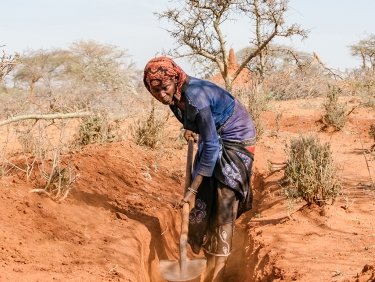

Drought in East Africa
Ethiopia's people have been gripped for months by a catastrophic drought that has largely escaped world public attention. Roughly eight million people, half of them children, face the threat of extreme hunger and the complete loss of their livelihoods. Ethiopia has suffered several overlapping crises in recent years. First, a plague of locusts caused major crop failures starting in late 2019. Next came the COVID-19 pandemic and a series of violent conflicts over territory and resources. With four consecutive rainy seasons having brought hardly any precipitation since late 2020, Ethiopia, Somalia and Kenya are now experiencing a catastrophic drought. It is one of the worst droughts in the Horn of Africa in 40 years. HEKS/EPER has been present locally for years and provides humanitarian aid for people in need.
HEKS/EPER is helping on the ground. Help us!
Yet again, the rainy season has hardly brought any water. Southern Ethiopia received less than 55 per cent of the average amount of rainfall. This is the fifth consecutive failed rainy season – a sad record. The next rainy season – expected to last from March to May 2023 – is forecast to bring below-average precipitation yet again. The people are confronting an alarming situation: pastoralist families are losing their animals, and farming families can barely afford food owing to increased energy and food prices. Children are falling ill because of a lack of clean water also at schools. The number of deaths from hunger is rising.
In Ethiopia, it is estimated that over two million livestock have already died owing to the lack of water and fodder. Another 22 million animals risk the same fate. The implications are dire for the food situation of the overwhelmingly pastoralist and cattle-rearing people in the southern Ethiopian lowlands, an area with no rivers and very few natural springs. Altogether some eight million people in Ethiopia are suffering from acute hunger.
Many families have no choice but to set out in search of alternative sources of income, or support from authorities and aid organizations. Ever more people are settling on the outskirts of cities, as they no longer have a livelihood in their places of origin. Better-off families too are increasingly being impacted by the situation. As a result, traditional intra-community support systems, in which richer people assisted the less fortunate, have all but stopped working. Everyone is now dependent on outside help.
Emergency aid is being scaled up
It emerges from the UN drought response plan for Ethiopia that not only is the expanding and persisting drought affecting more people, but it is also considerably exacerbating their plight and almost completely eroding what remains of resilience mechanisms. This has prompted HEKS/EPER to take emergency action: water is being trucked into especially hard-hit villages, as are supplies of hay and concentrated animal feed. Families who have already lost much of their livestock or those with severely malnourished children receive financial aid so that they are able to buy food.
Moreover, HEKS/EPER is continuing the support it has been providing since April to restore livelihoods, and is organizing additional climate change resilience training for 150 families.
In the light of the continuing drought, HEKS/EPER plans to expand humanitarian aid in the region and deliver even more life-saving assistance. For this, it needs your support!
